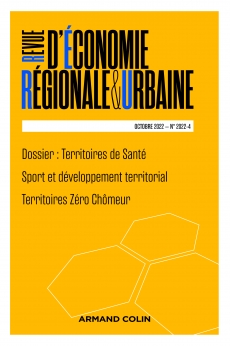
REVUE D'ÉCONOMIE RÉGIONALE ET URBAINE (4/2022)
Pour acheter ce numéro, contactez-nous
Recevez les numéros de l'année en cours et accédez à l'intégralité des articles en ligne.
Les tensions de rôles au travail des agriculteurs constituent un sujet très actuel encore peu traité. La mutation des systèmes agricoles conduit les agriculteurs à endosser de nouveaux rôles en particulier en matière de distribution de leur production et génère des contraintes qui sont une source importante de tensions pour ces exploitants. Ceux-ci ne disposent pas toujours des ressources nécessaires (connaissances, compétences, temps, etc.) pour faire face à ces évolutions. En retenant la grille des tensions de rôles, nous caractérisons les tensions que connaissent les agriculteurs dans l’exercice de leur activité. L’étude du discours de 22 éleveurs et producteurs laitiers met en évidence, pour les deux filières, la présence de tensions de rôles et des questionnements autour du positionnement à adopter. Les tensions concernent les choix de mise en marché (canaux, vente), la manière d’atteindre les objectifs et sont fortement liées aux aspects économiques et à l’évaluation des résultats.
The role tensions at work of farmers are a very current subject that is still not very much dealt with in a context where the suffering of farmers is more than ever being questioned. The challenges of the ecological transition, the transformation of consumption patterns, the role of industrialization of production processes and the evolution of the structure of agricultural sectors (with the weight of distributors) lead to questioning the roles of farmers in the agricultural ecosystem and in particular those of small farmers. To ensure the survival of their activity, farmers are forced to take on new roles, particularly commercial ones in terms of distribution of their production and sales. This generates constraints that are a major source of tension for them. They do not always have the necessary resources (knowledge, skills, time, etc.) to cope with these changes. We combine the grid of role tensions (Katz and Kahn, 1967) with that of Hobfol’s resources (1998, 2001) in order to characterize the tensions that farmers experience in carrying out their activity in order to cope with the need to adapt. The case study of a mid-mountain territory based on the analysis of the discourse of 22 livestock and dairy farmers highlights important role tensions generating important and permanent discomfort and stress linked to the need to act to ensure the sustainability of the farms. Our results allow us to better understand the mobilised resources by these situations of tension and to provide elements for imagining mechanisms for supporting and reducing these tensions. Collective strategies are an option to explore.